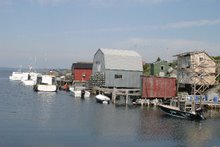SYDNEY, Australia (Reuters) -- The pristine Southern Ocean, which swirls around the Antarctic and absorbs vast amounts of carbon dioxide from the atmosphere, is slowly losing a fight against industrial gases responsible for global warming, scientists say.
The Southern Ocean's unique wind and storm conditions make it the world's greatest carbon "sink"; the earth's oceans absorb a third of the carbon dioxide in the atmosphere, and the Southern Ocean absorbs a third of that.
But the waters that surround Antarctica are becoming more acidic as they absorb increasing amounts of carbon dioxide produced by nations burning fossil fuels such as oil, coal and natural gas.
Deforestation and slash-and-burn farming also releases vast amounts of carbon dioxide stored in timber or peat bogs.
The more acidic an ocean gets, the less carbon dioxide it can soak up.
"It is becoming more difficult for the Southern Ocean to absorb the excess carbon dioxide," said Dr Will Howard of Australia's Antarctic Climate and Ecosystems Cooperative Research Centre.
Howard has just returned to the Australian Antarctic and Southern Ocean Research Program's base in southern Tasmania state after leading a team of 60 international scientists on a five-week expedition to gather evidence on how ocean systems are struggling to cope with the build-up of greenhouse gases.
"I would not say it's being killed," Howard said in a telephone interview. But it is being changed. "And once the system is altered ... it's going to be a different ecosystem," he said.
Rising acidification of the Southern Ocean has already begun to affect the ability of plankton -- microscopic marine plants, animals and bacteria -- to absorb carbon dioxide, scientists have found.
In the sea as on land, plants absorb carbon dioxide from the atmosphere through photosynthesis. Oceans soak up carbon dioxide from the air and sink it to the depths.
The Southern Ocean's unique wind and storm conditions make it the world's greatest carbon "sink"; the earth's oceans absorb a third of the carbon dioxide in the atmosphere, and the Southern Ocean absorbs a third of that.
But the waters that surround Antarctica are becoming more acidic as they absorb increasing amounts of carbon dioxide produced by nations burning fossil fuels such as oil, coal and natural gas.
Deforestation and slash-and-burn farming also releases vast amounts of carbon dioxide stored in timber or peat bogs.
The more acidic an ocean gets, the less carbon dioxide it can soak up.
"It is becoming more difficult for the Southern Ocean to absorb the excess carbon dioxide," said Dr Will Howard of Australia's Antarctic Climate and Ecosystems Cooperative Research Centre.
Howard has just returned to the Australian Antarctic and Southern Ocean Research Program's base in southern Tasmania state after leading a team of 60 international scientists on a five-week expedition to gather evidence on how ocean systems are struggling to cope with the build-up of greenhouse gases.
"I would not say it's being killed," Howard said in a telephone interview. But it is being changed. "And once the system is altered ... it's going to be a different ecosystem," he said.
Rising acidification of the Southern Ocean has already begun to affect the ability of plankton -- microscopic marine plants, animals and bacteria -- to absorb carbon dioxide, scientists have found.
In the sea as on land, plants absorb carbon dioxide from the atmosphere through photosynthesis. Oceans soak up carbon dioxide from the air and sink it to the depths.
For the rest of the article => Link

1 comment:
Article after article of leading scientists taking about our changing oceans due to huge amount of pollutants being pumped into our atmosphere. Perhaps if these scientists began to put more pressure on our governments’ something would be done sooner, but most likely not. As the article say, and from what I have been learning in Oceans, the Southern Ocean has a very strong circulation of water, and dose absorb a vast amount of carbon dioxide. If the plankton that thrives there was endangered, then what about the different fish species and other animals that feed on them, wouldn’t they also be endangered? I am saying this repentantly, but articles about our changing oceans due to pollution continue to be published every day. Who is going to take charge of this situation before it is too late? Though I am starting to think it might be too late to correct many of the predicted events no matter what we do. Humankind will just have to continue to evolve to the change environment, as be have been, since the beginning of humanity.
Post a Comment